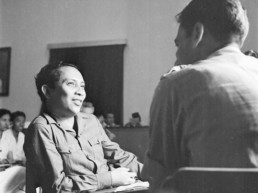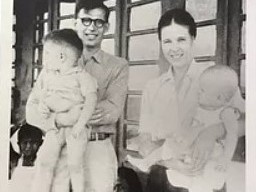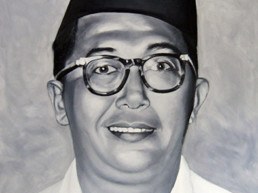Sutan Sjahrir: Indonesian revolutionary
In 1935 the twenty-six-year-old revolutionary Sutan Sjahrir sailed, together with several other prisoners and some guards, onto a brown-yellow river in the New Guinean jungle. The group was on their way to the Dutch concentration camp Boven-Digoel. Sjahrir had been imprisoned there for a year without any kind of process, on suspicion of hate speech and disruption of the public order. In one of the letters to his Dutch wife, which were later published as the Indonesische Overpeinzingen (published in English as Out of Exile), Sjarhrir wrote that he was punished because all he wanted to do was to serve his people. Sjahrir was a man of great intelligence, courage and inspiration, and his letters form an important source for historical research into the perspectives of Indonesian intellectuals in the colonial Dutch Indies. He nevertheless has not received much attention in the Dutch postcolonial debate. In this section Anne-Lot Hoek introduces Sutan Sjahrir, about whom she had previously published as a journalist, aiming for more interest in the Dutch debate over the struggles and search for freedom of the leaders of the Indonesian revolution.
Siebe Lijftogt: a critical voice branded a traitor
Former resistance fighter and Indonesian civil servant Siebe Lijftogt (1919-2005) challenged the narrative of a Netherlands that was on the right side of history during the Indonesian independence war on the island of Bali. He held on to the values of the anti-German resistance as they were manifested during the Second World War and encouraged his now powerful resistance friends to take responsibility. Inspired by Sutan Sjahrir, he felt that the Netherlands had only one job: helping to build up a new, independent Indonesia. But in his letters, which his children found after his death, he describes another reality. He became part of the colonial system, a system he fiercely criticized, and it isolated him in a terrible way. In this section Anne-Lot Hoek describes the life story of Siebe Lijftogt, about whom she had previously published as a journalist aiming to give more insight into the role of dissenting voices during the Indonesian independence war.
Rachmad Koesoemobroto: fighting for freedom, a life imprisoned
Stories of Indonesian anti-German resistance fighters in the Netherlands, such as the story of Rachmad Koesoemobroto (1911-1985), have to date not attracted much publicity in the Netherlands. Koesoembroto studied in Leiden in the 1930s and became a member of the Perhimpoenan Indonesia (PI). During World War Two he joined the Dutch resistance, together with his wife, and was involved in hiding Jewish children. After the war, he returned to his country of origin to pursue the ideals of freedom he had developed while staying in the Netherlands as well as to continue the battle for an independent Indonesia. He was imprisoned by the Dutch, and later again under Suharto, only to be released in 1981. His story shows the transnationality and continuity in ideas and ideals about freedom. The children of these forgotten Indonesian war heroes are still fighting for the recognition of their fathers in the Netherlands. In this section Anne-Lot Hoek introduces Rachmad Koesoemobroto, about whom she had previously published as a journalist, aiming for more recognition in the Dutch debate over the anti-colonial and anti-German resistance of Indonesians in The Netherlands.



